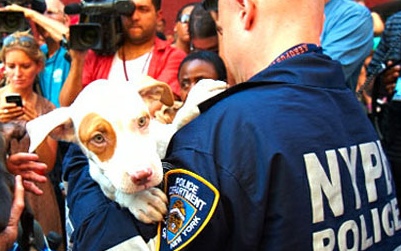Who’s in control? Tips for animal advocates working with law enforcement
Fresh AIR from D.C.: AIReporter Catherine Cowan is in Washington to fill us in on Taking Action for Animals (TAFA), a conference organized by The Humane Society of the United States.
By Catherine Cowan
When it comes to the role of law enforcement in handling animal crimes, Sherry Schlueter has heard it all. Bringing a perspective built through a 30-year career in law enforcement, Schlueter provided tips to animal advocates on the first day of TAFA during a half-day session on “How to Work with Local Law Enforcement and Animal Control to Address Animal Cruelty.”
After working as a humane agent in her 20s, Schlueter graduated from police academy in 1980, then created the first ever animal crime unit in law enforcement.
Reflecting the correlation between crimes against animals and vulnerable people, her unit expanded to investigate crimes against children, the disabled, and aged people, then expanded again to address crimes involving any dysfunction in the family that results in violence.
Now executive director of the HSUS South Florida Wildlife Center, Schlueter said one perspective from some law enforcement officers is that animal crimes are not their responsibility but should be handled by shelters.
Police often abdicate authority at animal crime scenes to the animal control officer, which is uncharacteristic of a profession whose job is to take charge, she said. But while animal control officers may know more about the species, they lack police academy education on matters such as search and seizure and rules of evidence.
“In every state animal abuse is a crime, and criminal matters are the purview of law enforcement,” Schlueter said. Instead of handing over a case to animal control, it should be handled as a team effort, much like child abuse cases are handled by both law enforcement and child protective services.
Some see animal abuse as ‘a victimless crime’
Another perspective heard from law enforcement is that animal crimes are low priority when they have murders, rapes and burglaries to investigate. “In fact, these investigations should be higher priority because they are in progress and easier to solve,” Schlueter said. “The level of crime may also be higher. For example, dog fighting is a felony in all 50 states, which ranks higher than graffiti.”
Some police officers think animal crimes require a specialist, but even uniformed officers can do an initial investigation, she said. Having a detective can help if there are multiple interviews or surveillance of suspects, but the initial investigation can act as an early intervention.
Some members of law enforcement see animal abuse as a victimless crime. This perspective ignores the role of the state, county or city prosecutor in bringing charges against a defendant, Schlueter said. It also ignores the sentiency of the animal victim as well as the complainant who witnessed the abuse, and it dismisses the intent of the legislature that enacted laws to protect animal victims.
Some agencies say they have no budget to investigate animal crimes, but they have no budget specific to many other types of crimes either, Schlueter said. Just as police may confiscate a car used in a hit-and-run or boat from a drug dealer, so they also should confiscate animals from cruelty situations.
There is a lot of public support for investigating animal crimes, she said, and law enforcement should care about public perception. People rarely complain about the police unless they don’t investigate.
Catherine Cowan has 18 years of experience in writing, editing, and communications. Starting as a reporter at a small-town newspaper in Indiana, she worked her way up to nation and world news editor at a top newspaper in Kentucky before moving into an editing role at a magazine on issues facing state governments. She has also done communications for a non-profit health care company and a state university research center. She is owned by four rescued and adopted cats and has a long-standing interest in animal issues and human-animal interactions.
Want more fresh AIR from TAFA?
See these articles from AIReporter Catherine Cowan:
‘Never give up’: Tips for animal advocates working with law enforcement
‘Not everyone is a villain’: Tips for animal advocates working with law enforcement
Top 13 tips for animal advocates working with law enforcement
Please respect copyright law. Sharing AIR links really helps! But copying more than a couple of paragraphs of content without permission is a no-no. If you’d like to use one of AIR’s articles or one of our photographs, kindly contact us at [airinfo AT yahoo DOT com].
Copyright © 2012 Animal Issues Reporter and AnimalIssuesReporter.org.
All rights reserved.

Leave a Reply